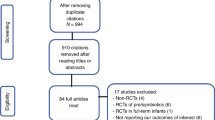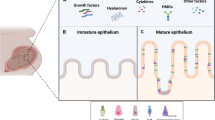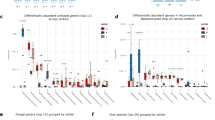Abstract
Observational studies demonstrating reduced rates of infections, necrotizing enterocolitis (NEC), and mortality in preterm infants fed their own mother’s milk, as opposed to formula, have prompted endeavors to achieve similar effects with the right choice of food and food additives. In a systematic review of meta-analyses and randomized controlled trials (RCTs), we considered nutritional interventions aimed at reducing the rates of infections, NEC, or mortality in very preterm infants. The overall effects of particular interventions were presented as risk ratios with 95% confidence intervals. In RCTs, pasteurized human donor milk, as opposed to formula, reduced NEC but not infections or mortality. No differences emerged between infants receiving human or bovine milk-based fortifiers. Pooled data of small trials and a recent large RCT suggested that bovine lactoferrin reduced rates of fungal sepsis without impact on other infections, NEC, or mortality. Pooled data of RCTs assessing the use of prebiotic oligosaccharides found reduced infection but not mortality. Enteral L-glutamine (six RCTs) lowered infection rates, and enteral L-arginine (three RCTs) reduced NEC. A meta-analysis sensitivity approach found multiple-strain (but not single-strain) probiotics to be highly effective in reducing NEC and mortality. Thus, selected food components may help to improve outcomes in preterm infants.
Similar content being viewed by others
Log in or create a free account to read this content
Gain free access to this article, as well as selected content from this journal and more on nature.com
or
References
Miller, J. et al. A systematic review and meta-analysis of human milk feeding and morbidity in very low birth weight infants. Nutrients 10, 707 (2018).
Cossey, V. et al. Pasteurization of mother’s own milk for preterm infants does not reduce the incidence of late-onset sepsis. Neonatology 103, 170–6 (2013).
Dicky, O. et al. Policy of feeding very preterm infants with their mother’s own fresh expressed milk was associated with a reduced risk of bronchopulmonary dysplasia. Acta Pædiatr. 106, 755–762 (2017).
Nasuf, A. W. A., Ojha, S. & Dorling, J. Oropharyngeal colostrum in preventing mortality and morbidity in preterm infants. Cochrane Database Syst. Rev. 9, CD011921 (2018).
Sadeghirad, B. et al. Human and bovine colostrum for prevention of necrotizing enterocolitis: a meta-analysis. Pediatrics 142, e20180767 (2018).
Panchal, H., Athalye-Jape, G. & Patole, S. Oropharyngeal colostrum for preterm infants: a systematic review and meta-analysis. Adv. Nutr. (2019).
WHO. Guidelines on Optimal Feeding of Low Birth-weight Infants in Low- and Middle-income Countries. (World Health Organization, Geneva, 2011).
ESPGHAN Committee on Nutrition, Arslanoglu, S. et al. Donor human milk for preterm infants: current evidence and research directions. J. Pediatr. Gastroenterol. Nutr. 57, 535–542 (2013).
American Academy of Pediatrics. Breastfeeding and the use of human milk. Pediatrics 129, e827 (2012).
Quigley, M., Embleton, N. D. & McGuire, W. Formula versus donor breast milk for feeding preterm or low birth weight infants. Cochrane Database Syst. Rev. 7, CD002971 (2019).
Tyson, J. E. et al. Growth, metabolic response, and development in very-low-birth-weight infants fed banked human milk or enriched formula. I. Neonatal findings. J. Pediatr. 103, 95–104 (1983).
Sullivan, S. et al. An exclusively human milk-based diet is associated with a lower rate of necrotizing enterocolitis than a diet of human milk and bovine milk-based products. J. Pediatr. 156, 562–567 (2010). e1.
Cristofalo, E. A. et al. Randomized trial of exclusive human milk versus preterm formula diets in extremely premature infants. J. Pediatr. 163, 1592–1595 (2013).
O’Connor, D. L. et al. Nutrient enrichment of human milk with human and bovine milk-based fortifiers for infants born weighing <1250 g: a randomized clinical trial. Am. J. Clin. Nutr. 108, 108–116 (2018).
Pammi, M. & Suresh, G. Enteral lactoferrin supplementation for prevention of sepsis and necrotizing enterocolitis in preterm infants. Cochrane Database Syst. Rev. 6, CD007137 (2017).
Sherman, M. P. et al. Randomized controlled trial of talactoferrin oral solution in preterm infants. J. Pediatr. 175, 68–73 (2016).
He, Y., Cao, L. & Yu, J. Prophylactic lactoferrin for preventing late-onset sepsis and necrotizing enterocolitis in preterm infants: a PRISMA-compliant systematic review and meta-analysis. Med. (Baltim.) 97, e11976 (2018).
Griffiths, J. et al. Enteral lactoferrin to prevent infection for very preterm infants: the ELFIN RCT. Health Technol. Assess. 22, 1–60 (2018).
ELFIN trial investigators group. Enteral lactoferrin supplementation for very preterm infants: a randomised placebo-controlled trial. Lancet 393, 423–433 (2019).
Manzoni, P. et al. Is lactoferrin more effective in reducing late-onset sepsis in preterm neonates fed formula than in those receiving mother’s own milk? Secondary analyses of two multicenter randomized controlled trials. Am. J. Perinatol. 36, S120–S125 (2019).
Manzoni, P. et al. Oral supplementation with Lactobacillus casei subspecies rhamnosus prevents enteric colonization by Candida species in preterm neonates: a randomized study. Clin. Infect. Dis. 42, 1735–1742 (2006).
Arsenault, A. B. et al. Dietary supplementation with medium-chain triglycerides reduces candida gastrointestinal colonization in preterm infants. Pediatr. Infect. Dis. J. 38, 164–168 (2019).
Cleminson, J., Austin, N. & McGuire, W. Prophylactic systemic antifungal agents to prevent mortality and morbidity in very low birth weight infants. Cochrane Database Syst. Rev. CD003850 (2015).
Austin, N., Cleminson, J., Darlow, B. A. & McGuire, W. Prophylactic oral/topical non-absorbed antifungal agents to prevent invasive fungal infection in very low birth weight infants. Cochrane Database Syst. Rev. CD003478 (2015).
Piening, B. C., Geffers, C., Gastmeier, P. & Schwab, F. Pathogen-specific mortality in very low birth weight infants with primary bloodstream infection. PLoS One 12, e0180134 (2017).
Shah, P. S., Shah, V. S. & Kelly, L. E. Arginine supplementation for prevention of necrotising enterocolitis in preterm infants. Cochrane Database Syst. Rev. 4, CD004339 (2017).
Amin, H. J. et al. Arginine supplementation prevents necrotizing enterocolitis in the premature infant. J. Pediatr. 140, 425–431 (2002).
Moe-Byrne, T., Brown, J. V. & McGuire, W. Glutamine supplementation to prevent morbidity and mortality in preterm infants. Cochrane Database Syst. Rev. 4, CD001457 (2016).
Avery, J. C. & Hoffmann, P. R. Selenium, selenoproteins, and immunity. Nutrients 10, 1203 (2018).
Darlow, B. A. & Austin, N. C. Selenium supplementation to prevent short-term morbidity in preterm neonates. Cochrane Database Syst. Rev. CD003312 (2003).
Aggarwal, R., Gathwala, G., Yadav, S. & Kumar, P. Selenium supplementation for prevention of late-onset sepsis in very low birth weight preterm neonates. J. Trop. Pediatr. 62, 185–193 (2016).
Terrin, G. et al. Zinc in early life: a key element in the fetus and preterm neonate. Nutrients 7, 10427–10446 (2015).
Terrin, G. et al. Zinc supplementation reduces morbidity and mortality in very-low-birth-weight preterm neonates: a hospital-based randomized, placebo-controlled trial in an industrialized country. Am. J. Clin. Nutr. 98, 1468–1474 (2013).
Chi, C., Buys, N., Li, C., Sun, J. & Yin, C. Effects of prebiotics on sepsis, necrotizing enterocolitis, mortality, feeding intolerance, time to full enteral feeding, length of hospital stay, and stool frequency in preterm infants: a meta-analysis. Eur. J. Clin. Nutr. 73, 657–670 (2019).
Dilli, D. et al. The propre-save study: effects of probiotics and prebiotics alone or combined on necrotizing enterocolitis in very low birth weight infants. J. Pediatr. 166, 545–551 (2015). e1.
Riskin, A. et al. The effects of lactulose supplementation to enteral feedings in premature infants: a pilot study. J. Pediatr. 156, 209–214 (2010).
Cotton, C. M. Early, prolonged use of postnatal antibiotics increased the risk of necrotising enterocolitis. Arch. Dis. Child Educ. Pr. Ed. 95, 94 (2010).
Alexander, V. N., Northrup, V. & Bizzarro, M. J. Antibiotic exposure in the newborn intensive care unit and the risk of necrotizing enterocolitis. J. Pediatr. 159, 392–397 (2011).
Kuppala, V. S., Meinzen-Derr, J., Morrow, A. L. & Schibler, K. R. Prolonged initial empirical antibiotic treatment is associated with adverse outcomes in premature infants. J. Pediatr. 159, 720–725 (2011).
Ting, J. Y. et al. Association between antibiotic use and neonatal mortality and morbidities in very low-birth-weight infants without culture-proven sepsis or necrotizing enterocolitis. JAMA Pediatr. 170, 1181–1187 (2016).
AlFaleh, K. & Anabrees, J. Probiotics for prevention of necrotizing enterocolitis in preterm infants. Cochrane Database Syst. Rev. CD005496 (2014).
Lau, C. S. & Chamberlain, R. S. Probiotic administration can prevent necrotizing enterocolitis in preterm infants: A meta-analysis. J. Pediatr. Surg. 50, 1405–1412 (2015).
Sawh, S. C., Deshpande, S., Jansen, S., Reynaert, C. J. & Jones, P. M. Prevention of necrotizing enterocolitis with probiotics: a systematic review and meta-analysis. PeerJ 4, e2429 (2016).
Thomas, J. P., Raine, T., Reddy, S. & Belteki, G. Probiotics for the prevention of necrotising enterocolitis in very low-birth-weight infants: a meta-analysis and systematic review. Acta Pædiatr. 106, 1729–1741 (2017).
Chang, H. Y. et al. Multiple strains probiotics appear to be the most effective probiotics in the prevention of necrotizing enterocolitis and mortality: an updated meta-analysis. PLoS One 12, e0171579 (2017).
Sun, J. et al. Effects of probiotics on necrotizing enterocolitis, sepsis, intraventricular hemorrhage, mortality, length of hospital stay, and weight gain in very preterm infants: a meta-analysis. Adv. Nutr. 8, 749–763 (2017).
Zhang, G. Q., Hu, H. J., Liu, C. Y., Shakya, S. & Li, Z. Y. Probiotics for preventing late-onset sepsis in preterm neonates: a PRISMA-compliant systematic review and meta-analysis of randomized controlled trials. Med. (Baltim.) 95, e2581 (2016).
Rao, S. C., Athalye-Jape, G. K., Deshpande, G. C., Simmer, K. N. & Patole, S. K. Probiotic supplementation and late-onset sepsis in preterm infants: a meta-analysis. Pediatrics 137, e20153684 (2016).
Aceti, A. et al. Probiotics prevent late-onset sepsis in human milk-fed, very low birth weight preterm infants: systematic review and meta-analysis. Nutrients 9, 904 (2017).
Olsen, R., Greisen, G., Schrøder, M. & Brok, J. Prophylactic probiotics for preterm infants: a systematic review and meta-analysis of observational studies. Neonatology 109, 105–112 (2016).
Dermyshi, E. et al. The “golden age” of probiotics: a systematic review and meta-analysis of randomized and observational studies in preterm infants. Neonatology 112, 9–23 (2017).
van den Akker, C. H. P. et al. Probiotics for preterm infants: a strain-specific systematic review and network meta-analysis. J. Pediatr. Gastroenterol. Nutr. 67, 103–122 (2018).
Hagen, P. C. & Skelley, J. W. Efficacy of bifidobacterium species in prevention of necrotizing enterocolitis in very-low birth weight infants. A systematic review. J. Pediatr. Pharm. Ther. 24, 10–15 (2019).
Guthmann, F. & Bührer, C. Routine probiotics in preterm infants? Arch. Dis. Child Fetal Neonatal Ed. 96, F311–F312 (2011).
Foster, J. P., Seth, R. & Cole, M. J. Oral immunoglobulin for preventing necrotizing enterocolitis in preterm and low birth weight neonates. Cochrane Database Syst. Rev. 4, CD001816 (2016).
Ananthan, A., Balasubramanian, H., Rao, S. & Patole, S. Clinical outcomes related to the gastrointestinal trophic effects of erythropoietin in preterm neonates: a systematic review and meta-analysis. Adv. Nutr. 9, 238–246 (2018).
Sharpe, J., Way, M., Koorts, P. J. & Davies, M. W. The availability of probiotics and donor human milk is associated with improved survival in very preterm infants. World J. Pediatr. 14, 492–497 (2018).
Weaver, G. et al. Recommendations for the establishment and operation of human milk banks in Europe: a consensus statement from the European Milk Bank Association (EMBA). Front Pediatr. 7, 53 (2019).
Denkel, L. A. et al. Protective effect of dual-strain probiotics in preterm infants: a multi-center time series analysis. PLoS One 11, e0158136 (2016).
Davis, J. M. et al. Enrollment of neonates in more than one clinical trial. Clin. Ther. 39, 1959–1969 (2017).
Huffman, M. D., Xavier, D. & Perel, P. Uses of polypills for cardiovascular disease and evidence to date. Lancet 389, 1055–1065 (2017).
Selak, V. et al. Reaching cardiovascular prevention guideline targets with a polypill-based approach: a meta-analysis of randomised clinical trials. Heart 105, 42–48 (2019).
Acknowledgements
Preparation of the paper was supported in part by a grant from German Federal Department of Education and Research (FKZ 03ZZ0829B) within the framework of the NeoBiom project.
Author contributions
C.B., H.F. and S.W. formulated the questions to be addressed, designed the search strategy, and assessed the hits. Quantitative data were compiled by C.B. who prepared the first version of the paper. The paper was subsequently critically reviewed by H.F. and S.W. All three authors approved the version to be published.
Author information
Authors and Affiliations
Corresponding author
Ethics declarations
Competing interests
The authors declare no competing interests.
Additional information
Publisher’s note Springer Nature remains neutral with regard to jurisdictional claims in published maps and institutional affiliations.
Supplementary information
Rights and permissions
About this article
Cite this article
Bührer, C., Fischer, H.S. & Wellmann, S. Nutritional interventions to reduce rates of infection, necrotizing enterocolitis and mortality in very preterm infants. Pediatr Res 87, 371–377 (2020). https://doi.org/10.1038/s41390-019-0630-2
Received:
Revised:
Accepted:
Published:
Issue date:
DOI: https://doi.org/10.1038/s41390-019-0630-2
This article is cited by
-
The gut microbiome, resistome, and mycobiome in preterm newborn infants and mouse pups: lack of lasting effects by antimicrobial therapy or probiotic prophylaxis
Gut Pathogens (2024)
-
Systemic immune markers and infection risk in preterm infants fed human milk fortified with bovine colostrum or conventional fortifier, a secondary analysis of the FortiColos trial
Infection (2024)
-
Glutamine inhibits inflammation, oxidative stress, and apoptosis and ameliorates hyperoxic lung injury
Journal of Physiology and Biochemistry (2023)
-
Per- und polyfluorierte Alkylsubstanzen (PFAS) und Stillen: Nutzen-Risiken-Abwägungen
Monatsschrift Kinderheilkunde (2022)
-
Evidence-Based Approaches to Minimize the Risk of Developing Necrotizing Enterocolitis in Premature Infants
Current Treatment Options in Pediatrics (2022)



